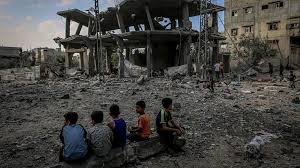Europe at a crossroads: The EU’s moral failure in Gaza

Brussels: European Union faces a moral reckoning as Gaza endures relentless violence. Today, on August 17, 2025, the devastation in Gaza is impossible to ignore. Airstrikes have increased to 599 in July alone, leading to the highest number of civilian fatalities in over a year. Aid-related violence has surged drastically, with almost 700 deaths, including nearly 400 killed near humanitarian distribution sites—where hope for survival turned into tragedy.
Yet, even as the humanitarian crisis deepens and hunger tightens its grip, the European Union, an institution built on the foundations of human rights and the protection of civilians, finds itself paralyzed by internal division and inertia. Member states squabble over policy and rhetoric, unable to reach consensus on actions as basic as calling for an immediate ceasefire, let alone imposing credible sanctions on Israel for restricting aid or violating international law.
International law is unambiguous: The protection of civilians, the prohibition of collective punishment, and the requirement to facilitate humanitarian aid are foundational elements of the Geneva Conventions. Israel’s ongoing operations in Gaza, including using deadly force against civilians attempting to access food and medical aid, has led to accusations from some EU officials that the situation “looks very much like genocide”—a phrase loaded with historical and legal weight.
But law and morality, when set against the cold machinery of European politics, become fractured. Take the recent attempt to restrict Israeli access to EU research funding in response to this humanitarian disaster. Despite support from nations like Belgium, Germany’s opposition—rooted in historical responsibility toward Israel—has effectively halted progressive action. More critical voices, including Spain, push for the complete suspension of the EU-Israel agreement, while others propose freezing trade benefits. For every gesture of condemnation, there’s another of hesitation, dilute and divided.
If it feels shocking to witness starvation as a tactic in modern conflict, it should be. UN and EU humanitarian officials warn that famine is unfolding before our very eyes in Gaza. Calls for urgent action intensify: stop the starvation, protect humanitarian space, ensure aid is never politicized. Yet each appeal is met by institutional stasis—declarations without teeth, promises without deadlines, statements that sound righteous but carry no real weight.
Between 13 and 31 July alone, over 793 people were killed in Gaza, a majority civilians. On July 20, a single incident near Zikim saw at least 90 people die waiting for World Food Program aid. The aftermath of each tragedy reverberates through crowded hospitals, destroyed neighborhoods, and the hearts of parents who cannot feed their children.
How did it come to this? The EU once prided itself as the world’s largest humanitarian donor, champion of international law, and broker of peace in the Middle East. But the Gaza crisis has revealed Europe’s painful limitations. As early as December 2023, deep internal rifts surfaced: Only 17 out of 27 member states voted for a UN Gaza ceasefire, with Germany, Italy and others abstaining or opposing. By August 2025, a collective call for “immediate ceasefire” was still impossible. Hungary’s veto and Germany’s abstention, wrapped in historic guilt, stalled the EU’s very spirit—its values traded for inaction.
In Brussels, foreign ministers meet, proposals circulate—ban imports from Israeli settlements, suspend participation in programs like Horizon Europe and Erasmus+, cut trade. But each measure is met with the same refrain: consensus is unlikely. Hungary and Germany resist; France and Italy bicker over strategy. Human rights advocates, from Oxfam to Human Rights Watch, characterize this as “political negligence,” a betrayal of EU principles in the face of overwhelming evidence of atrocity crimes.
For Palestinian civilians, EU deliberations are both remote and intimately present. Each day without food, each night under the drone of bombers, each minute awaiting humanitarian aid carries the consequences of Europe’s indecision.
Gaza’s death toll is now driven as much by political inertia as by military action. A senior EU commissioner made headlines in early August when he broke with official policy, accusing both the scale and nature of destruction in Gaza as fitting the pattern of genocide. This statement marks a historic divergence—evidence that, at least among some in the EU, the moral cost of inaction has become intolerable.
Nowhere are the tensions more visible than in Germany. For decades, Berlin’s foreign policy has held Israeli security as its “Staatsräson” (reason of state)—a pledge rooted in the shadow of the Holocaust. Even as Chancellor Olaf Scholz halted weapons exports “that can be used in the Gaza Strip” by Israeli forces, Germany’s refusal to back sanctions or suspend trade with Israel echoes its struggle to reconcile historical obligations with present-day human rights.
Spain’s push for full suspension, Sweden and the Netherlands’ calls for partial freezes, and Belgium’s advocacy for direct action highlight the growing cracks in EU consensus. What once seemed a united front now looks fractured, unable even to agree on shared language.
Recent initiatives from Israel included a daily pause in military operations and reopening of aid corridors, framed as “significant steps” under EU mediation. But humanitarian agencies say these changes are “woefully inadequate,” and skepticism persists. Nearly 700 people died trying to reach aid in July alone—as famine looms, the EU’s inability to guarantee unimpeded access further exposes its diminishing influence.
The world is watching the EU. Palestinian families, Israeli citizens yearning for safety, humanitarian workers risking their lives—all rely on the global institutions built to protect human dignity. Yet, as Gaza endures relentless violence, the European Union faces a reckoning: Will it finally put principles above politics, or will history remember its silence, its spectacle of paralysis, as complicit in the catastrophe?
Europe—birthplace of human rights law, champion of international humanitarian norms—now stands at a critical juncture. The voices calling for justice grow louder within and beyond its borders. As famine engulfs Gaza and violence mounts, the moral test of the European Union is not in what it says, but in what it fails to do.
Let us hope that by the next emergency briefing, the EU finds its voice—a voice that speaks not just for itself, but for those beyond its borders, for the law and the values it claims to embody.




